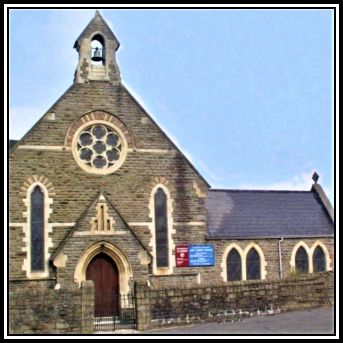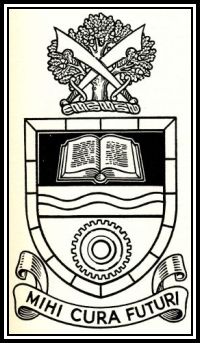LEN RAWLE
THE PROFESSIONAL AMATEUR
& ORGANIST SUPREME
-oOo-
PAGE ONE:
THE EARLY YEARS
-oOo-
1938-1948: LIFE IN WALES
-oOo-
 Who is this delightful baby?
Who is this delightful baby?
Leonard George Rawle was born on January 4th 1938 to Thomas Leslie (Les; 1909-2005) and Edith Rawle (1912-1992) in Tonypandy, a mining town in the Rhondda Valley in South Wales. His father was the manager of a grocery store, Meadow Dairy and his mother was a self-taught pianist who also sang in local operetta productions. Although Len’s father never had any form of musical training, he nonetheless enjoyed listening to music and came to appreciate organ tone in particular. Len recalls that his father was fascinated by the Theatre Organs and their sounds and took his future wife to see a number of them during their courting days. Len also notes that in his grandparents’ home that there was a large harmonium that visiting organists would play.
Although Len enjoyed his school days, he quickly developed a preference for musical activities, such as choral singing at church and playing the recorder and violin. In his later schooling, he especially enjoyed more practical subjects such as metal and wood working and mechanics and technical drawing, French and Mathematics.
-oOo-
 Dennis & Len
Dennis & Len
Both Len and his brother Dennis (1940) were encouraged to pursue musical activities. Len began piano and the theory of music lessons when he was four years of age with a local music teacher, Mr. Davies, who was also an orchestra conductor and chapel organist and continued instruction under his tutelage until the family moved to the London area when he was ten. Dennis took violin lessons for a while at school, but soon gave them up since he preferred other activities.
 St. Andrew’s Church Tonypandy
St. Andrew’s Church Tonypandy
Len recalls that his initial interest in the organ began when he first noticed the pipes of the organ behind the pews he sang in at St. Andrew’s Church that he attended. Soon after, and with the wholehearted support and encouragement of his mother, he developed a wish to play the instrument and take lessons, but it was recommended that proficiency at the piano was essential before beginning them at the organ.
In 1945, Len begun taking piano examinations set by the London College of Music at its Cardiff establishment and music theory examinations set by the Associated Board of Music. At this time, official organ lessons were restricted to Grade 8 piano students of the London College of Music.
-oOo-
Len also recalls with pleasure the first time that he heard a theatre organist. It was as a 2-year old when his father took him to a concert given by Sandy MacPherson (1897-1975) at the imposing Methodist Central Hall Tonypany. However, his interest in the Theatre Organ was really peaked a little later when his father explained the difference between a church organ and the Theatre/Cinema Organ that he and his mother enjoyed seeing rise up from the orchestra pit of the Capitol Cinema Cardiff.
When Len was 11-years old, the Rawle family spent their summer holiday at Bournemouth. The proposed trip encouraged Len to write to the borough organist Harold Coombs (1903-1964) who played the Theatre Organ at the Pavilion Theatre that summer and ask if he might come and see the organ during his visit. Mr. Coombs apparently welcomed Len when he came to the Theatre and allowed him to play both the LaFleur/Hammond Organ in the Pavilion Ballroom and the 4-manual Compton Theatre Organ in the Pavilion Theatre although he required help with the playing of the pedals.
-oOo-
1948: THE MOVE TO LONDON
-oOo-
In 1948, The Rawle Family moved from Wales and into a terrace house in South Ruislip in North-West London where his father opened a brand new grocery store for his employers. In his new home, Len attended Lady Bankes Junior School and then Bourne Secondary School, both in Ruislip Manor and now both demolished. While at school, Len continued with piano lessons with a new teacher, a local lady, Mrs. Mayer. However, after six months she told him that he needed more than she would be able to teach him, and it was suggested that he take lessons from concert pianist and a guiding light at the Guildhall School of Music, Martin David.
 Len, age 12 years, at his Mother’s piano
Len, age 12 years, at his Mother’s piano
-oOo-
Dr. Martin David was a prominent pianist and had an excellent reputation as a teacher and proved willing to take Len as a pupil. He also organised concerts held at the Cavendish Pavilion in Eastcote and given by himself and his students and was a regular contributor to the yearly Ealing Music Festival.
 The Cavendish Pavilion
The Cavendish Pavilion
Dr. David had a large music room at his home in Eastcote with two grand pianos in place. Len says that his instruction included coaching him while playing one of the instruments as his teacher played at the other. He says that this teaching style proved to be invaluable and allowed him quickly to pass from the purely practical side of playing and encouraged him to listen more intently and more easily to incorporate Dr. David’s suggestions and examples. Len says that many years later this listen and copy technique proved invaluable when he introduced the Japanese approach to music education for Yamaha UK.
 Queen Elizabeth Hall
Queen Elizabeth Hall
Len recalls that he attended and enjoyed a number of Dr. David’s concerts that he gave at the Queen Elizabeth Hall on London’s South Bank. It was also Dr. David that suggested that Len would benefit from participating in local concerts and festivals and from playing with other musicians. On one occasion Len entered a competition playing duets with fellow student Gwendolen Collins at the Ealing Music Festival and won. Their playing was commented in the publication, There and Then, where they were applauded for their sensitivity and tone colour. The adjudicator at the Festival was the renowned musicologist, Antony Hopkins (1921-2014), who in his public assessment of their playing that the feelings that they put over were to be admired. Len states that this comment was of great encouragement to him and helped him make good use of natural nervousness, which he felt at the time.
-oOo-
1948: FIRST TIME PLAYING THE PIPE ORGAN
 St. Paul’s Church Ruislip Manor
St. Paul’s Church Ruislip Manor
In 1948, at the age of 11 and having reached the suggested level of proficiency at the piano (Grade 8), Len went, at the encouragement of his father, and knocked on the vicarage door of St. Paul’s Church in Ruislip Manor, Middlesex, and asked the vicar if he might be allowed to play the church organ.
-oOo-
 St. Mary’s Church South Ruislip
St. Mary’s Church South Ruislip
The church that Len regularly attended was St. Mary’s Church in South Ruislip and was where he sang in the choir. Unfortunately for Len, the church was not equipped with a pipe organ, but with a Harmonium, causing him to seek a pipe organ to play elsewhere.
-oOo-
Evidently the vicar of St. Paul’s immediately said yes to his request and he was invited to play the organ on Monday evenings. He received some instruction on playing the instrument after he had been told that he was playing the organ as a piano. Len admits to not playing with his feet at first except for an occasional Bottom C or perhaps the final Bass Note of a hymn!
Len remembers leaving each week a half-crown piece in order to cover the cost of the electricity that the organ and lights used. He learned later that his parents would secretly come into the church often and sit at the back of the church and listen to his playing since they hoped to hear that he had taken to the organ as he had the piano.
 A Half-Crown Piece
A Half-Crown Piece
Len learned quickly, and after a mere six weeks, he was asked to play at services for the Boys Scouts and Girls Guides. Although he never got to play at a regular church service here, he did play for the occasional wedding and christening.
-oOo-
By the age of 17, Len was receiving classical organ lessons from the renowned teacher, George Metzler, the organist at the church of St. Stephen’s Walbrook in the City of London.
 St . Stephen’s Walbrook
St . Stephen’s Walbrook
-oOo-
1954: LEAVING SCHOOL
&
THE MAKING OF A CITY GENTLEMAN
-oOo-
 Crest of Acton Technical College
Crest of Acton Technical College
Once Len left school in the late 1950s, he attended the Acton Technical College in West London where he studied for a number of much enjoyed practical courses, as well as academic subjects towards taking national General Certificate of Examinations (GCE). Len did not complete the course, as his father suggested the time was right to contribute to the family purse and in fact to take up the offer of one of his customers. This gentleman provided a letter of introduction to the insurance world in the City of London.
Following on the letter of recommendation, in 1954, Len was given an appointment with Mr. Freeman, the Deputy Manager, of the London and Lancashire Insurance Company, and duly attended for an interview for a position as a Junior Clerk, but with a keen eye on becoming a surveyor.
Several days later, Len took the Central Line from close to his home to Bank Station in The City of London. This would be the first time that he had ever visited the area. The interview went well, and he was offered a place, which led to him leaving college. Prior to starting, he went out and bought a gray suit, a bag and an umbrella!
Len worked at the Company for two years before being called up for the obligatory two years of National Service. He continued with his piano and organ lessons until papers arrived posting him to Aldershot Garrison for the initial two weeks of square bashing (Basic Training).

-oOo-
-oOo-
-oOo-

Hello Len.
I remember in the mid-60s you used to do spots at Silver Blades Ice Rink at Streatham, deputizing for the resident organist John Bowery.
If you recall a young rink electrician, skater and sometimes DJ who used to come up on the stage and chat to you while you were playing – that was me.
I was pleased and interested to come across your site which I found when I was digging around to find some information on the Compton organ that was previously installed in the Gaumont, Rose Hill near Sutton. What caused this was that I was writing up my memories of Tulse Hill School which is where Compton was installed after the Gaumont went to Bingo. I was at Tulse Hill from 1957 – 62 and well remember the controversy it caused raising money for the organ when most students and parents wanted a swimming pool.
After finding your site I found a reference that the Compton was listed as being “in store in Buckinghamshire” in 2005 after the school was demolished in 1995, then found that the clarinet pipes from it are currently being being sold on ebay so I guess it was broken up.
What a great career you have had!
Best wishes,
Andy Jackson
Many thanks for your comment. I have forwarded it to Len along with your email address.